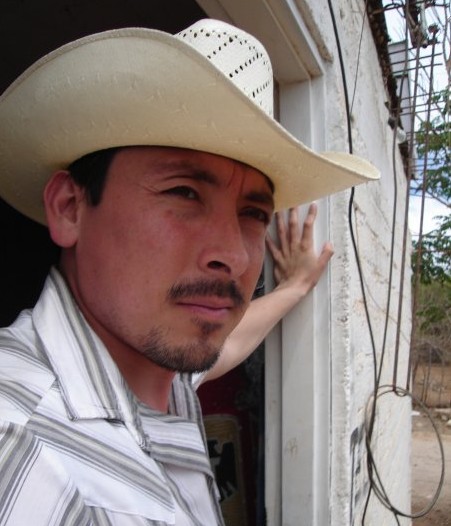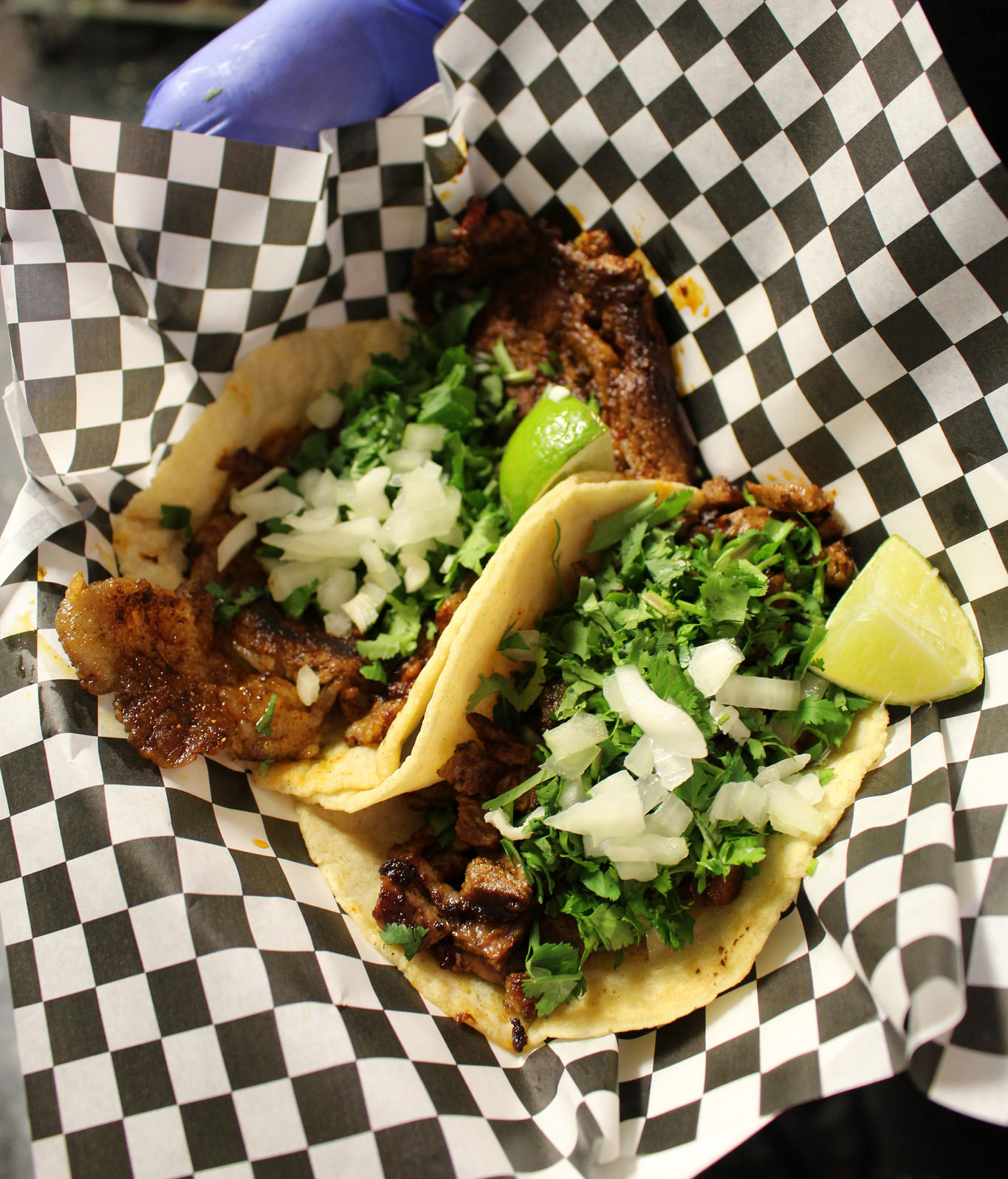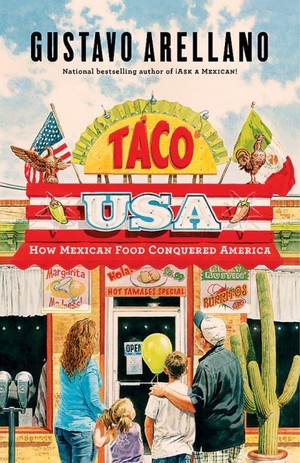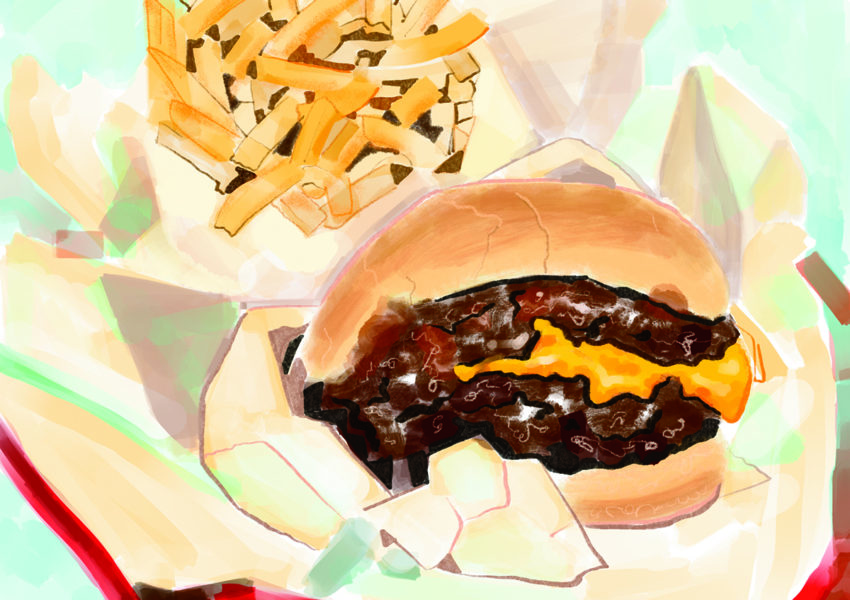ARE YOU TACO LITERATE? Lessons from Steven Alvarez
by Gustavo Arellano (Gravy, Winter 2016)
It’s not often that a notorious white supremacist reminds me of Mexican food or my Latino friends. This fall, The Washington Post ran a story about Derek Black, the son of Don Black, founder of the influential racist website Stormfront. The younger Black has repudiated the ideas of his father, and the Post ran a photo of a defiant, unrepentant Don as a sort of counterbalance.
![]() The photo’s location caught my eye: Crossville, Tennessee. I don’t think of the city as a focal point for racists. Every year for nearly a decade, my wife and I have spent a comfortable night at the local Holiday Inn Express off I-40 during our summer vacation. And every time we visit, we eat dinner at Cancun Mexican Restaurant, enjoying their generous margaritas, filling combo plates of cheesy enchiladas and burritos smothered in red sauce, and a salsa that scorches. We’re usually the only Latino customers, and we feel fine.
The photo’s location caught my eye: Crossville, Tennessee. I don’t think of the city as a focal point for racists. Every year for nearly a decade, my wife and I have spent a comfortable night at the local Holiday Inn Express off I-40 during our summer vacation. And every time we visit, we eat dinner at Cancun Mexican Restaurant, enjoying their generous margaritas, filling combo plates of cheesy enchiladas and burritos smothered in red sauce, and a salsa that scorches. We’re usually the only Latino customers, and we feel fine.

This year, we hosted dear friends, Steven and Sara Alvarez. He’s an assistant professor of writing, rhetoric, and digital studies at the University of Kentucky (and an SFA Smith Symposium Fellow); she’s finishing her doctorate in rhetoric and composition at the University of Louisville. I met Steven years ago, when he invited me to lecture at UK, and our wives hit it off last year. The Alvarezes are wonderful, brilliant people, and we spent hours catching up that day in Crossville, ending with those giant Cancun platters.
Shortly after, the two announced that they were moving back to Sara’s native New York City, where Steven earned his PhD at CUNY. In 2017, he begins teaching at St. John’s University in Queens. It’s a big loss for the South, as Steven has become an ambassador for Mexican food in el Sur. Thanks to him, I experienced the wondrous, carne asada–filled burritos at Tortillería y Taquería Ramirez in Lexington, which I documented for an SFA oral history project.
Steven has recently taken academia by storm with his philosophy of “taco literacy”: examining Latino immigrant communities through the seemingly simple acts of eating and talking about Mexican food. He’s lectured on the subject across the country and is doing impactful fieldwork to document how Mexican restaurants are changing the South—and how the South is changing Mexican immigrants.
Taco Literacy: Examining Latino immigrant communities through the seemingly simple acts of eating and talking about Mexican food.
It’s not hasta la vista for Steven and the South, but hasta luego. “In my research, I get to know folks, and I meet young families, and we become friends, develop confianza,” he tells me. “So the South extends my community. I’ve learned so much in the friendships I’ve made across Kentucky.”

He was able to gain that confianza from other immigrants not just because he’s Latino, but because he approached them with new eyes and an open mind. Steven is from the copper-mining town of Safford, Arizona, the son of an immigrant from Sonora and a Chicano army veteran. Now thirty-six, he was the first in his family to graduate from college.
In the summer of 2003, after graduation, he went to work for Americorps. Steven cut trails in Georgia’s Okefenokee Swamp, tutored Spanish-speaking students at an elementary school in Goose Creek, South Carolina, did construction demolition for a housing program in Birmingham, and built houses in Lexington, Kentucky, with Habitat for Humanity. There, standing at a urinal in a honky-tonk bar, Steven realized the South was more than the Faulkner novels he read as an undergrad.
“A mexicano, doing his thing, started talking to me in Spanish,” Steven says. “We chatted for a bit, and I asked him if there were many mexicanos in Kentucky. I remember he said, ‘Pos’ bastantes, güero!’”1

Steven returned to Lexington in 2012, when he interviewed at the University of Kentucky. During his job talk, he dropped facts about the Bluegrass State’s Mexican population that stunned the crowd. “They had no idea there were undocumented students at the University,” Steven says. “They had no idea about the over-100 percent increase in Mexican folks for the previous decade.”
He accepted the job and dove into exploring his new home, specifically the area of Lexington nicknamed “Mexington” for its large Latino population. In the barrio’s taquerías, bakeries, markets, and restaurants, Alvarez developed the idea for his taco literacy class.

“Tacos can be read,” the profe says. “They carry social meanings—they are part of foodways networks of people who conduct their rich lives in languages. In the case of mexicanos in Kentucky, their foodways are bilingual. Their literacies communicate not only their identities, but also their sense of place, and, I think most importantly, are a form of communicating care.”
Tacos can be read. They carry social meanings—they are part of foodways networks of people who conduct their rich lives in languages.

The university approved the course, officially titled “Taco Literacy: Public Advocacy and Mexican Food in the US South,” for the spring 2016 semester. Students visited local businesses, heard from restaurateurs, read articles on Mexican food (including my own), and wrote papers that ranged from straightforward restaurant reviews to ethnographic analyses of the Mexican food scene at horse races. It would have been just another cool college course if not for a January article in VICE Munchies. The Q&A with Steven went worldwide: He did interviews for Buzzfeed, Univision, NPR, and El País in Spain. Hundreds of other media outlets picked up the story.
The attention was career-changing. He’s now planning a book that will focus on Kentucky, North Carolina, and Alabama, tracking each state’s Mexican communities back to their homeland. Steven will continue the taco literacy course at St. John’s and plans to educate New Yorkers on Southern and Latino-Southern foodways.
“I am thinking of organizing a writing program for college students to engage them as a community coming to the table,” he adds. “Maybe not to resolve their differences, but at least to hear one another out. To communicate their views, and to listen between bites.”
So why not continue in the South? “In first grade, I told my teacher that someday I was going to live in the Big Apple because I loved Ghostbusters. And then the Ninja Turtles came around, and I was done.”
No matter where Steven lives, we’ll always have Crossville. We aren’t children of the South, yet we love the region and seek to understand it and help make it better. So when I read the Washington Post article and saw the picture of an angry Don Black, I thought: Our South is better than that. Optimistic, more inclusive. The future. And filled with Mexican food.
1 “A bunch, white boy!”




